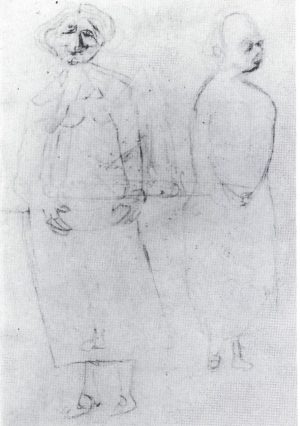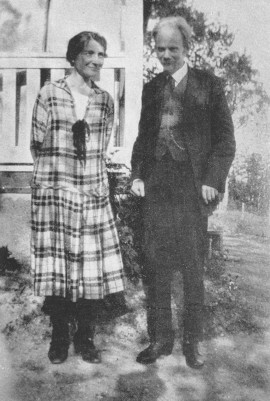
Emilia Fogelklou (1878-1972) – author, historian of religion, and fifteen years a widow – set out to write a biography of her deceased husband, Arnold Norlind, in 1944. It turned into an autobiography, but not, as many other women have done, by presenting herself indirectly through a glowing portrait of her significant other. It was more as if she had not been born until she met him. Their relationship pulsates with an inner light wholly unrelated to earthly fortune. Arnold is one of the great love stories in Swedish literature, and a singular coming-of-age narrative.
In December 1914, Norlind sent Fogelklou his translation of the first canto of Dante’s La Divina Commedia (Eng. tr. The Divine Comedy). Although they had never met, he heard her voice in what she had written. “In sending this manuscript, I humbly suggest that it points to what you and I have in common. Not the poem itself, the stanzas that meander one way or the other, but the very reality they reflect.”
Fogelklou did not open the thick, blue envelope right away. She found herself in a state of torpor and bewilderment. Her father was in the advanced stages of cancer, their home about to be sold, and her writing was at a standstill. She finally opened the letter on Christmas day, and her “skies brightened”.
“That evening she passed through a strange portal whose arched mirror was designed such that brightness always supported dark suffering”, she writes in the opening of Arnold. The special inflection that echoes through the book is audible even here – delicate but strong, lofty, almost solemn, but simple and unpretentious. With infinite discretion, Fogelklou elevates her story beyond time and everyday existence with words of humility and quiet amazement such as wonder, awe, and delight. Like many humble servants of God before her, she writes in the third person. The first person would have sounded shrill and discordant in this hymn to sublimation.
Apart from a brief encounter in 1915, Fogelklou and Norlind did not see each other for another seven years. But his translations of Dante arrived reliably, if not particularly often, during a period in which she had to deal with the deaths of her father, mother, and one of her sisters, not to mention her own spiritual agony: “They were pilgrims who walked up the Mountain of Purgatory along their own separate paths.”
When they finally met in Lund, they would study together in the reading room of the university library, stroll around Observatory Park, the ramparts, and the rest of the city. “Oddly enough, they never ran into anyone they knew. It was as though a genie had bestowed cloaks of invisibility upon them to rescue them from small-town gossip. They were lovers who did not know what they loved most: heaven or earth, or Dante’s world, or each other’s profound grasp of phenomena and ideas that had been so hopelessly buried within them for as long as they could remember.”
Like Dante and Beatrice in The Divine Comedy, Fogelklou and Norlind began to take leave of each other as soon as they met, and death was their constant companion during the seven years they lived together.
The saga of Fogelklou and Norlind parallels the epic poem by Dante that originally brought them together, and when they are finally united in Berlin after another brief entr’acte, it is as though she has scaled Mount Purgatory and gazed into Paradise. “They sailed through each other’s skies with a strange sense of recognition,” she wrote. Two middle-aged people are born anew. “It was as though they were going to make up for all the games they had not shared in childhood.” Sometimes they took each other by the hand. “Other than that, they were not prone to caressing. The feeling ran too deep. They touched each other with atmospherics.”

Arnold became the first volume of Emilia Fogelklou’s autobiographical trilogy, the high point of her prolific output. Barhuvad (1950; Bareheaded), the second volume, is an account of her life before she met Norlind. Resfärdig (1954; Ready to Travel), the last volume, takes place after his death. The books may seem out of order at first. Why does she not tell her story chronologically or in flashbacks? Arnold answers that question. Meeting Norlind was both the culmination and the beginning of her life.
“From early childhood, my life had been a roller coaster ride of humiliation and exaltation”, she writes in Barhuvad. As the beloved first-born, she had the distinct sense of being chosen and special. She never quite got over the shock of having a younger sibling. Highly gifted, sensitive to a fault, and endlessly receptive, she alternated between profound joy and almost total desolation. Even as a child, she sought the intensity that arises when word merges with feeling, and she tried to see beyond the limits that society dictated. “Mi [her nickname] leaned against the gate that faced the road”, Fogelklou writes in Barhuvad. “She gazed into the distance, lost in endless contemplation. She remained there hour after hour, unmoving, deaf to the anxious shouts of her parents. A mysterious melody quivered deep within her.”
The Divine Comedy tells of Dante’s descent to the underworld to meet the souls of the dead. In Inferno, he encounters those who have been condemned to eternal torment. Then he ascends Mount Purgatory and continues towards Paradise. He wanders the last stretch with Beatrice – the object of his longing, whom he had regarded as unattainable – and it turns out that she has guided him on the right path in various ways over the course his journey.
Arnold reverses gender roles. He is the luminous entity that repeatedly leads her by the hand out of the pit of depression.
As an academic, Fogelklou took it upon herself to explore otherworldly phenomena in contravention of the rationalism that was all the rage at the time. Her theological and philosophical tracts transgressed the accepted boundaries of knowledge. She traced that interest back to a spiritual awakening she had experienced at the age of twenty-four: “It was 29 May 1902”, she writes in Barhuvad. “She sat in the grove behind Föreningsgatan 6 and prepared a lesson.” The time and place are forever engraved in her memory. As a religion teacher, she was tormented by doubt as the claws of depression tightened their grip on her. But suddenly everything changed. “Without visions or voices or human intervention, she experienced a great, redemptive inner miracle in a state of extraordinary wakefulness. It was as if the ‘empty shell’ had broken in half. All her heaviness and agony, her entire sense of unreality, dissolved in an instant. She felt the power of beneficence, joy, and light in the form of a luminous, sublime, protective, unmistakeable truth at the deepest part of her soul.”
Birgitta (1919; Birgitta) presents Saint Birgitta in a whole new light. Challenging the traditional image of a power-seeker who was neurotic about sex, Fogelklou highlights the maternal and protective aspects of Saint Birgitta’s revelations.
The book was scorned and ridiculed as scandalous when it first came out. “Not until much later did people realise what an extraordinary and even masterly work it is”, Sven Stolpe writes in the afterword to the second edition (1955). “Only a woman with great talent and experience, and a Christian mystic to boot, could fully grasp what Saint Birgitta was all about. We can put any doubt about that to rest.”
The incident is a turning point not only for the protagonist’s consciousness, but for her career. It also lays the groundwork for her encounter with Arnold twenty years later.
Barhuvad ends just before they meet. Resfärdig begins immediately after his death. But it ultimately leads back to him. The life that began when they first met comes full circle. After a long grieving process that literally threatens her life, a 1951 diary entry announces, “I am here with Arnold in inconceivable joy.” She is in Delphi. The ‘empty shell’ has cracked once more. Life presents itself to her again, and she concludes the book by looking back at the strange and marvellous roads that have led her to the vistas of the other Reality, always capitalised. “Arnold, whose path through life led him deeper and deeper into the world of radiance, had offered her a glimpse of its power and glory, even as she still had lessons to learn in this borderland before embarking on a new journey – this time farther in.”
Translated by Ken Schubert

